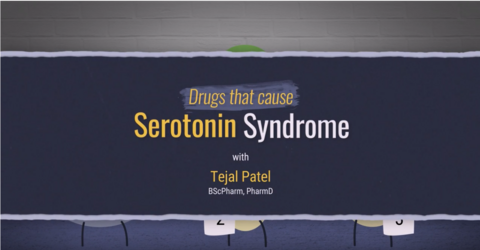
Researchers identify drug mixtures that can lead to serotonin syndrome
Mixing antidepressants with common drugs found in your medicine cabinet could lead to serotonin syndrome, a condition caused by excessive levels of the chemical in the brain.
Professors Dr. Tejal Patel, Dr. Kelly Grindrod and Jamie Kellar, along with PhD candidate Ai-leng Foong, conducted a wide-ranging review of existing publications on serotonin syndrome. They identified specific drug interactions—including those involving antidepressants known as Selective Serotonin Reuptake Inhibitors (SSRIs), which when taken in combination with some pain medications, cough medicine, and some natural remedies can contribute to serotonin syndrome.
People with serotonin syndrome may experience nervousness, difficulty sleeping, nausea and diarrhea, tremors, and dilated pupils. As toxicity increases, these symptoms can become more severe, affecting movement, autonomic responses (temperature, increased heart rate and breathing), and the ability to think clearly. Serotonin syndrome is rare but can be fatal if the toxic levels of the chemical are not addressed.
"Though serotonin is most often linked to mood, and certain types of antidepressants, many drugs such as some types of pain medication, illicit drugs like MDMA and cocaine, some herbal products, and some cough, cold and allergy products can affect serotonin,” said Tejal Patel, a professor at Waterloo’s School of Pharmacy. “The risk for the syndrome is greater when patients are on high doses of two or more serotonin-elevating drugs, especially if they increase serotonin in different ways or if drugs that increase serotonin levels are used in conjunction with drugs that prevent the breakdown of serotonin.”
“If someone is experiencing serotonin syndrome, they’ll typically see symptoms within one hour to one day of upping their dose, starting a new medication or taking another drug in combination with their antidepressant medication.”
The study also identified drugs previously thought to cause serotonin syndrome that actually do not, which could help people taking the drug to make more informed choices related to multiple medications uses.
Serotonin is a chemical that transmits messages in the body’s central nervous system, sending information throughout the brain and from the brain to other parts of the body. Medications can affect the amount of serotonin in the brain and affect the functioning of the central nervous system.
Serotonin syndrome happens fast—within one to two days of starting a new drug that affects serotonin levels or of increasing the dose of the causative drug.
In a 2013 report, the Organization for Economic Cooperation and Development reported that nine per cent of Canadians took antidepressants. That same year, the US Centre for Disease Control reported that 11 per cent of Americans were taking these drugs.
“With increasing use of antidepressants for mood and anxiety and other conditions such as pain, sleep, and menopausal hot flashes, clarity is needed to help health care professionals prevent, identify, and manage serotonin toxicity,” said Patel. “In reviewing the information that is out there on the symptoms and drugs that cause serotonin toxicity, we believe we believe this work can inform both health care providers and patients of some of the risks associated with taking prescription and street drugs while on an antidepressant.”
The researchers’ findings were recently published in the journal Canadian Family Physician.